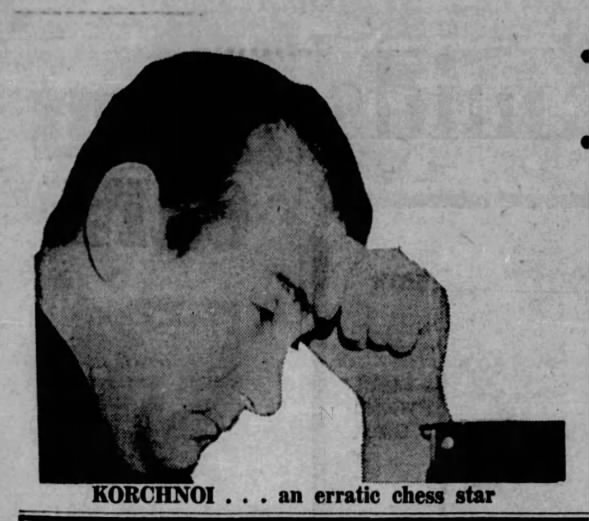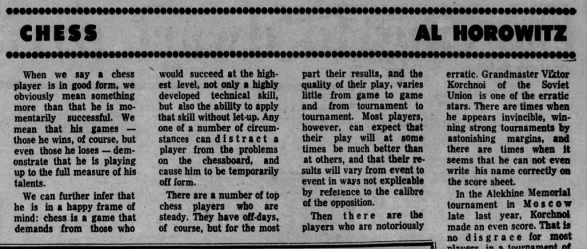< Prev Index Next >
 Chess Fri, Mar 24, 1972 – 48 · The Province (Vancouver, British Columbia, Canada) · Newspapers.com
Chess Fri, Mar 24, 1972 – 48 · The Province (Vancouver, British Columbia, Canada) · Newspapers.com
 Chess Fri, Mar 24, 1972 – 48 · The Province (Vancouver, British Columbia, Canada) · Newspapers.com
Chess Fri, Mar 24, 1972 – 48 · The Province (Vancouver, British Columbia, Canada) · Newspapers.com
[Caption]: Korchnoi . . . an erratic chess star.
When we say a chess player is in good form, we obviously mean something more than that he is momentarily successful. We mean that his games — those he wins, of course, but even those he loses — demonstrate that he is playing up to the full measure of his talents.
We can further infer that he is in a happy frame of mind: chess is a game that demands from those who would succeed at the highest level, not only a highly developed technical skill, but also the ability to apply that skill without let-up. Any one of a number of circumstances can distract a player from the problems on the chessboard, and cause him to be temporarily off form.
There are a number of top chess players who are steady. They have off-days, of course, but for the most part their results, and the quality of their play, varies little from game to game and from tournament to tournament. Most players, however, can expect that their play will at some times be much better than at others, and that their results will vary from event to event in ways not explicable by reference to the caliber of the opposition.
Then there are the players who are notoriously erratic. Grandmaster Viktor Korchnoi of the Soviet Union is one of the erratic stars. There are times when he appears invincible, winning strong tournaments by astonishing margins, and there are times when it seems that he can not even write his name correctly on the score sheet.
In the Alekhine Memorial tournament in Moscow late last year, Korchnoi made an even score. That is no disgrace for most players in a tournament of that strength, but for him it was a cruel disappointment.
He came right back to tie for first place with Anatoly Karpov of the Soviet Union in the Hastings Christmas Congress played shortly after the Alekhine event.
Was Korchnoi in good form at Hastings? Certainly he was more successful than at Moscow, but, if one is to judge from his own notes to his victory over Karpov, he did not think so.
In the diagramed position, for example, he played 23. Q-KB1, a move he awards a question mark, recommending instead 23. P-QR4, followed by P-QN3 B-Q3 and K-B2. Karpov, Korchnoi relates, should have replied 23. … QR-B1; 24. NxR QxN, saving a tempo on the line in the game.
Korchnoi also criticizes his next move, 24. NxR/R, and Karpov's 24. … BxN (after 24. … RxN, Karpov would have been able to get his queen-bishop back into play much more easily.)
It is hard to criticize Korchnoi as stringently as he criticizes himself. He also played some pretty moves in this game. Note 37. N-N2, for example, when on 37. … NxN; 38. B-K6ch followed by 39. Q-R5 would have won for White. If Korchnoi was not in his best form at Hastings, he was at least much closer to it than at Moscow.
Another player in bad form in Moscow was the world champion, Boris Spassky of the Soviet Union. He played Korchnoi on one of the latter's good days. Spassky's form is now a matter of special interest. Bobby Fischer of the United States, his challenger for the world title, is probably now the most consistent player of all.
 Chess Fri, Mar 24, 1972 – 48 · The Province (Vancouver, British Columbia, Canada) · Newspapers.com
Chess Fri, Mar 24, 1972 – 48 · The Province (Vancouver, British Columbia, Canada) · Newspapers.com























